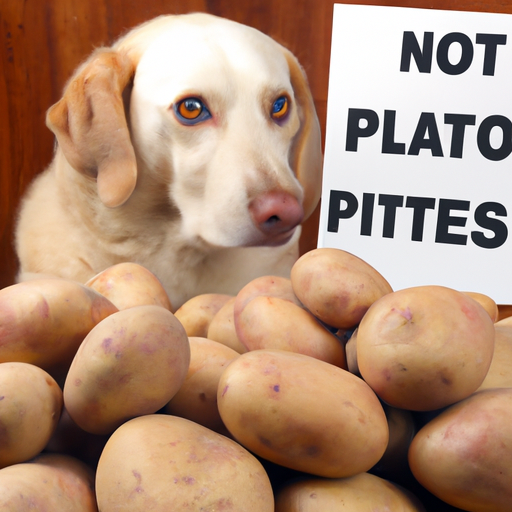As a caring pet owner, you might often find yourself wondering about the foods that are safe and unsafe for your dog to consume. While it’s common knowledge that certain foods like chocolate and grapes are harmful to dogs, there are numerous others that might not be as obvious. One such food is the raw potato. Although potatoes are a common ingredient in many dog foods and treats, raw potatoes can be harmful to dogs. This article aims to shed light on why dogs can’t eat raw potatoes and what the potential dangers are.
Table of Contents
- Understanding the Potato
- Why Raw Potatoes are Harmful to Dogs
- Effects of Solanine on Dogs
- Safe Ways to Feed Potatoes to Dogs
- Frequently Asked Questions
Key Takeaways
- Raw potatoes contain solanine, a toxic compound that can be harmful to dogs.
- Solanine can lead to symptoms like vomiting, muscle weakness, and neurological issues.
- Properly cooked potatoes, without any additives, can be safe and nutritious for dogs.
Understanding the Potato
Potatoes are a staple food in many households. They’re versatile, delicious, and packed with nutrients like vitamin C, potassium, and fiber. However, these starchy vegetables also contain a natural compound called solanine, which can be toxic in large amounts. Solanine is most concentrated in the green parts of the potato and in the potato’s sprouts.
Why Raw Potatoes are Harmful to Dogs
While humans can tolerate a certain amount of solanine, dogs are more sensitive to this compound. The ingestion of raw potatoes, particularly green ones or those with sprouts, can lead to solanine poisoning in dogs. According to the Pet Poison Helpline, solanine is one of the most common causes of poisoning in dogs.
Effects of Solanine on Dogs
When a dog ingests solanine, it can cause several health issues. Some of the symptoms of solanine poisoning include:
- Vomiting
- Diarrhea
- Abdominal pain
- Loss of appetite
- Muscle weakness
- Neurological issues like trembling, seizures, or paralysis
If you notice any of these symptoms in your dog after it has consumed raw potatoes, it’s essential to seek immediate veterinary attention.
Safe Ways to Feed Potatoes to Dogs
While raw potatoes can be harmful to dogs, properly cooked potatoes can be a safe and nutritious treat. Here are some tips for safely feeding potatoes to your dog:
- Always cook the potatoes thoroughly. This reduces the solanine levels and makes the potato more digestible.
- Avoid adding any seasonings or toppings. Foods like butter, salt, and garlic can be harmful to dogs.
- Serve the potatoes in moderation. Like any treat, potatoes should make up no more than 10% of your dog’s daily calorie intake.
For more information on safe foods for dogs, you can check out this article on One Top Dog.
Frequently Asked Questions
1. Can dogs eat cooked potatoes?
Yes, dogs can eat cooked potatoes. When cooked properly, the potatoes are safe and can be a good source of nutrients like vitamin C and potassium.
2. What should I do if my dog eats a raw potato?
If your dog eats a raw potato, monitor them closely for any signs of solanine poisoning. If you notice symptoms like vomiting, diarrhea, or muscle weakness, contact your vet immediately.
3. Are there other foods that are harmful to dogs?
Yes, there are several other foods that are harmful to dogs. Some of these include chocolate, grapes, onions, and garlic. For a comprehensive list, you can check out this guide from One Top Dog.
4. Can dogs eat sweet potatoes?
Yes, dogs can eat sweet potatoes. They are often a healthier alternative to regular potatoes and are less likely to contain solanine. However, like regular potatoes, they should be cooked properly and served in moderation.
In conclusion, while potatoes can be a healthy addition to your dog’s diet, raw potatoes can pose a significant health risk due to their solanine content. As a responsible pet owner, it’s crucial to understand the potential dangers of certain foods and to always provide your pet with a safe and balanced diet.
For more tips on pet care and diet, you can visit One Top Dog.



